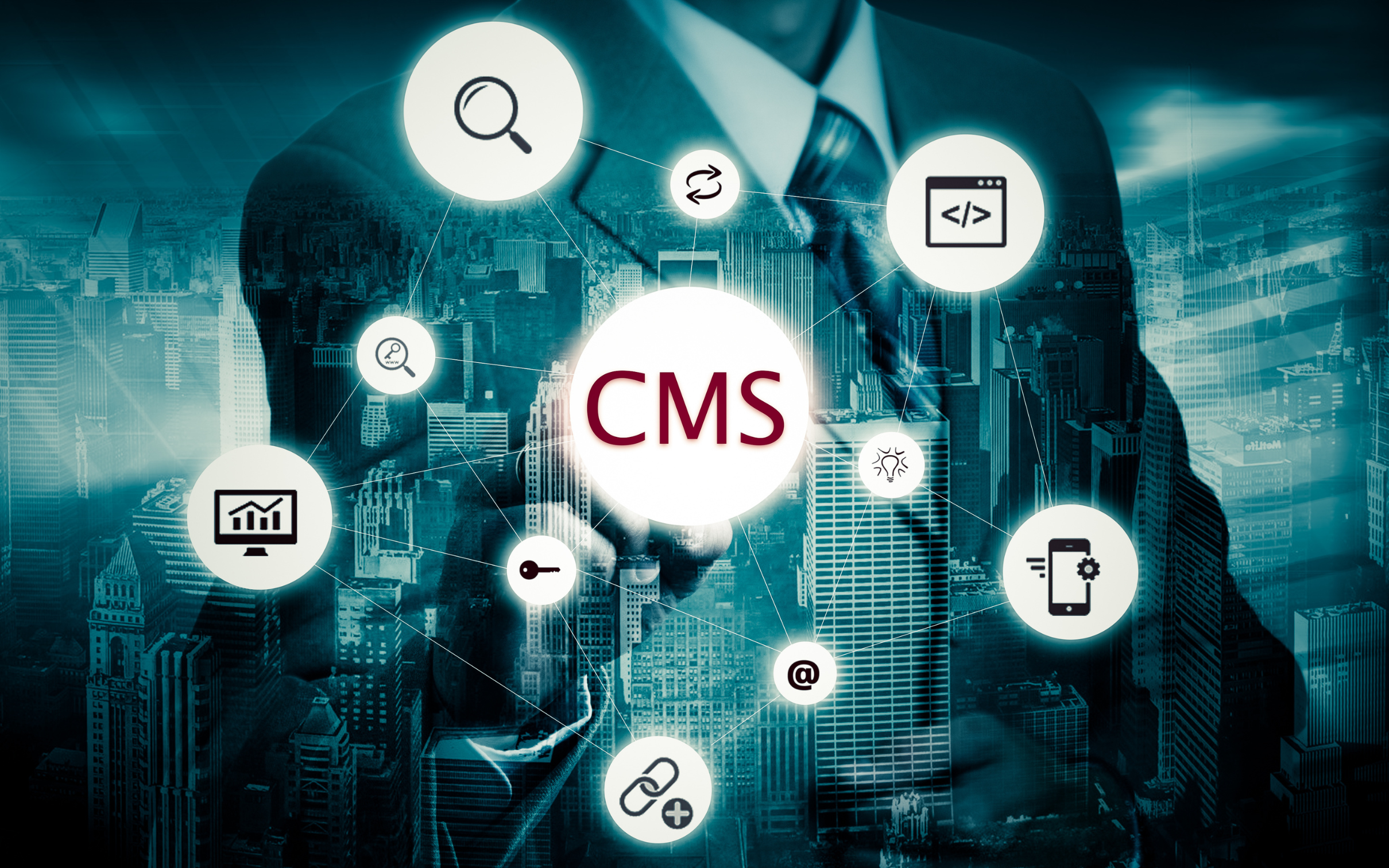CMS have established themselves as essential tools for business and people who want to create and manage their websites. With a seemingly endless list of solutions at their disposal, the best CMS to go for can be very hard to determine.
This article is intended to provide insight to the 15 best CMS platforms to look into in 2024, in addition to the features that make each of them suitable for use in improving your content management abilities.
What is content management system?
Basically a CMS is an application for effective and efficient organization and delivery of Web content. It provides the users with the avenue to sort, save, and share distinct forms of information in form of text, images, videos, and documents among others.
A CMS is designed in such a manner that it may easily be used across the staff which are not technically sound for writing codes and scripts. There are many benefits to using a CMS and many platforms come with templates that contain added features for SEO, user management, and customizable templates which help businesses, bloggers, and website owners.
Importance of content management system(CMS)
Understanding how your CMS will function and prioritize the needs of your business is essential. It helps to organize the presentation and content generation processes and as such helps the organization to maintain the integrity of the brand across the different channels.
A well-designed CMS has the effect of facilitating teamwork, thus removing barriers to the creation of content and its regular updates. A CMS aids businesses to change content frequently adapts to demand of the market and the customers.
It can therefore be concluded that through easy to use interfaces as well as sound publishing cycles, which are offered by CMS platforms, content reaches its targets in the best possible way, thus, boosting the overall user interaction and sales conversion processes.
How the Right CMS Can Impact Your Website’s Performance and User Experience
Here are some ways in which a suitable CMS can enhance your performance:
Optimized Page Load Times:
It should also be noted that a favorable CMS design involves caching, reducing file size and employing more efficient structures for code. First, fast loading pages make the website easier to use by customers which in turn increases the sites’ ranking since speed is always a key requirement in ranking a site.
Responsive Design and Mobile Optimization:
Today the users can visit websites on different gadgets, and that is why the websites created should be adapted for the PCs, tablets and including the smartphones.
Scalability and Performance Under High Traffic:
A good CMS should be able to handle the flow of traffic and content as it was at the beginning of its growth. Techniques such as load distribution, content delivery networks (CDNs) as well as database tuning may be used to ensure that the user experience does not degrade during such circumstances.
Intuitive Content Management and Publishing Workflows:
A well designed and easy to use CMS enhances the role of the content author and editor to grasp the responsibility of creating meaningful content rather than worrying about the content management systems features.
How to Choose one of the Best CMS Platforms for Your Website
1. Identify Your Website's Requirements
To discuss the different CMS platforms, firstly, it is necessary to evaluate the basic needs of the website. Some considerations and specific features of a website you should look at include; the type of content which you want to post- text, Image or video.
2. Assess the Relative Usability and Openness
First of all it should be mentioned that the primary activities of any CMS are content and publishing. The interfaces of the platforms must be friendly such that you and your team will find it easy to call for content creation, editing and posting.
3. Assess Security and Scalability
Website security is an important factor as hacked websites or threats on websites can lead to devastating consequences. For more information on some of the potential CMS platforms out there, seek to know how they protect themselves by which means, for instance do they update frequently, patch any vulnerability that they find, or which industry standard have they complied with?
List of best 15 CMS Platforms in 2024
1. Drupal
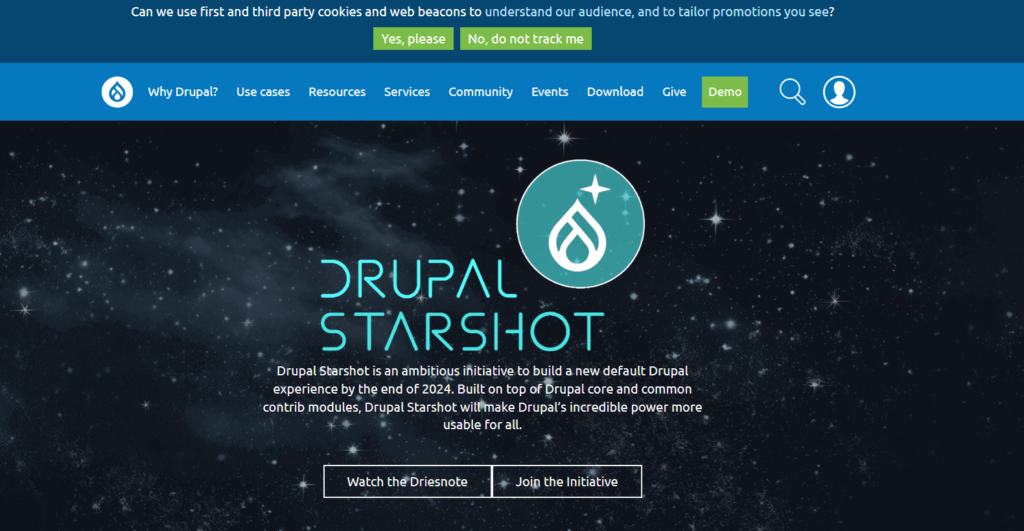
Drupal is an incredibly powerful, user-friendly, flexible, cross-platform open source CMS with a comprehensive set of built-in tools for content management and development, which makes Drupal ideal for large-scale business projects and applications.
Key Features:
- It has multiple-language support,
- a rich and customizable feature set,
- as well as the possibility of scaling this CMS as needed and as large numbers of developers can vouch for its usefulness.
Pros:
- Scales well and designed for high-traffic and huge websites
- Reliability and Data protection measures and updates
- Supported by a large number of third-party modules.
Cons:
- Currently, most of the interfaces present a steep learning curve for the non-technical users.
- Comparatively less flexibility for multiple modules or functionalities
- High learning curve due to the complexity in installation and configuration
Pricing: Free and open-source
Website: https://www.drupal.org/
2. Joomla
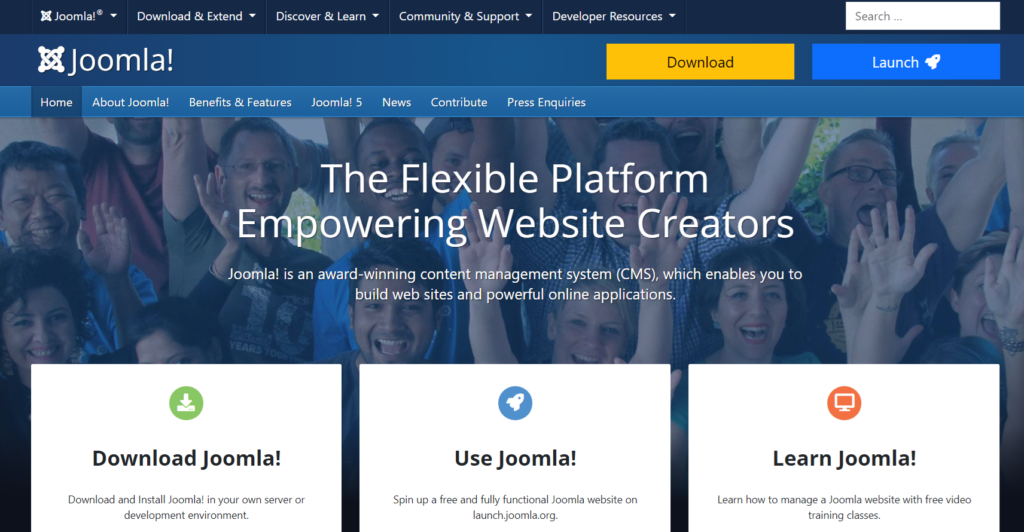
Joomla is another popular open-source CMS that has become quite popular due to its accommodation for extensions and a very simple interface for those who are not very familiar with or interested in web development.
Key Features:
- Easy to use for administrative purposes,
- a wide selection of extensions,
- effective caching and optimization options and
- friendly and dedicated community.
Pros:
- Interface was very appealing, and easy to navigate.
- A source of extensions, templates, themes
- Strong community support
Cons:
- No big website compatibility as it aims at small to medium websites
- Updating problems While using a web application
- Lacks in number of additional options in comparison with some other
Pricing: Free
Website: https://www.joomla.org/
3. WordPress
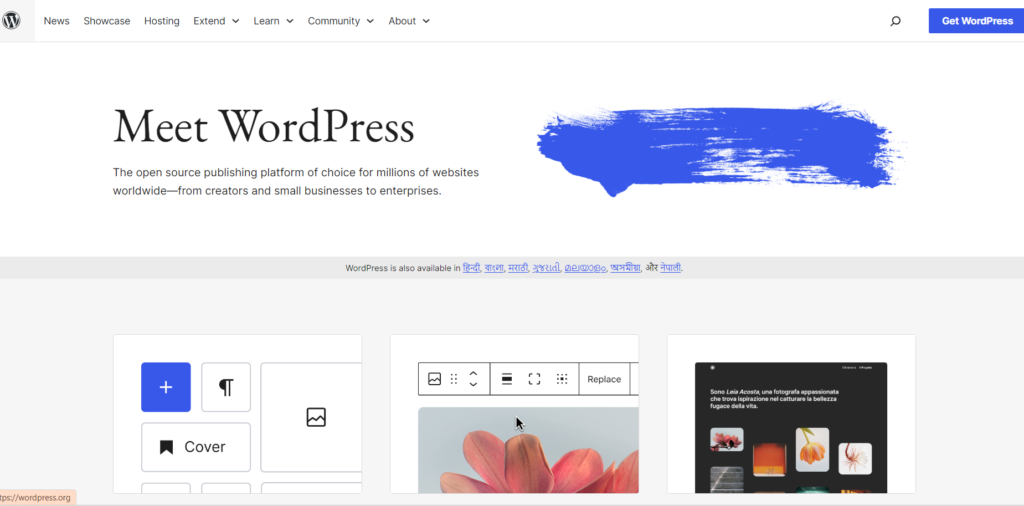
WordPress is actually one of the most widely used CMS out there, due to its easy to use interface, flexibility and, of course, the huge number of plugins available.
Key Features:
- Three particularly noteworthy attributes of WordPress include— great usability, unparalleled selection of plugins and themes, blogging functionality, and
- SEO optimization features, as well as an active user community.
Pros:
- It is easy, uncomplicated, and convenient for a beginner to learn and navigate through.
- Infinite choice of plugins and themes
- Robust support and requisite inputs.
Cons:
- Scalability is somewhat poor for larger and more intricate web developments
- With extensions, there are possibilities for various security risks
Pricing: Starting – Rs. 160/- / year
Website: https://wordpress.com/
4. Magento

Magento is an open-source e-business platform that has rather extensive functionality and can be used by online merchants with large criteria.
Key Features:
- Affordable pricing,
- robust omnichannel solution,
- an extensive range of products,
- well-developed marketing and SEO options,
- a wide range of integrations.
Pros:
- Highly scalable and effective for large e-commerce stores with a vast number of products.
- Customization parameter is flexibility
- Support provided by the community to students as well as other facets associated with it.
- Compatibility and durability to build strong foundations in their marketing and SEO strategies.
Cons:
- Steep learning curve and the program is too complicated for non-technical users.
- Relatively expensive as compared to other options.
- Relatively limited number of websites beyond just e-commerce site
Pricing: Pricing varies
Website: https://about.magento.com/Magento-Commerce
5. Shopify

Shopify is an advanced cloud-based E-commerce solution that has easy navigation, powerful tools, & compatibility with all sale channels.
Key Features:
- Ease of setting up and managing the store,
- new themes, secure web hosting, stock control, marketing measures, and
- possible integrated payment solutions.
Pros:
- Easy to navigate design and is suitable for first-time users.
- Its biggest advantage is the complete absence of hosting and the lack of required software installation.
- More internet usability and equipped mobile commerce
Cons:
- Less flexibility in setting compared to hosted counterparts
- Prohibitive transaction costs for third party payment processors
Pricing: Paid plans start from $29 to $299 per month with extra charges for using the particular Pro-Theme and Apps available.
Website: https://www.shopify.com/
6. HubSpot CMS
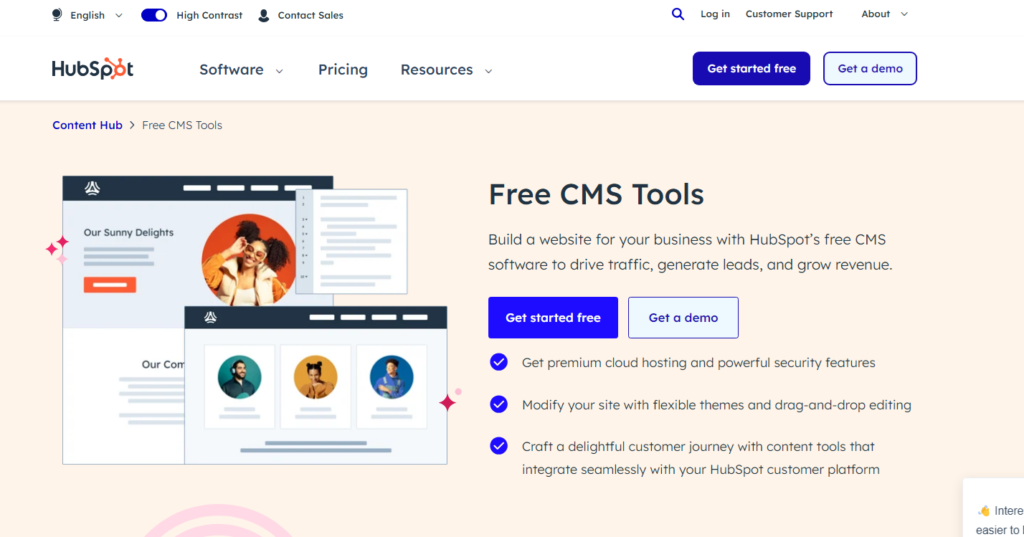
HubSpot CMS is an all-in-one content management and marketing tool specifically tailored for the implementation of the inbound marketing concept and the subsequent generation of leads and customer management.
Key Features:
- Drag-and-drop website builders,
- SEO tools,
- The ability to add multiple users, marketing automation, integration with the CRM system, and analytics.
Pros:
- As the solution has been designed as an add-on for HubSpot, it integrates with the marketing and sales platforms.
- The control panel was also easy to negotiate as it comes with a friendly Web design and content management system.
- Free Templates include a strong SEO and analytical properties.
Cons:
- Customization is relatively less in contrast to various other CMSs
- High prices in comparison to small businesses or individuals.
Pricing: The pricing strategies incorporated in the HubSpot software include monthly subscription for CMS Hub at $25, subject to additional charges for other HubSpot Hubs and plans further up the scale.
Website: https://www.hubspot.com/products/cms
7. Contentful

Contentful stands as a next-gen, API-based headless CMS that allows for a solution for content management which is both flexible and scalable for delivering content across channels.
Key Features:
- Automation with API-first methodology,
- Web Content modeling,
- Content translation, and
- Integration with different ecosystems.
Pros:
- Multiple delivery channels because of its scalability.
- Content modeling and managed content
- DTE (Developer Testing Experience) and developer integration functionalities are remarkable
Cons:
- Steep learning curve initially.
- Some restrictions in the framework’s out-of-the-box capabilities in some applications
- Higher costs
Pricing: Monthly plans for a business that starts at $489 monthly; other prices depend on chosen add-ons and usage volume.
Website: https://www.contentful.com/
8. Kentico
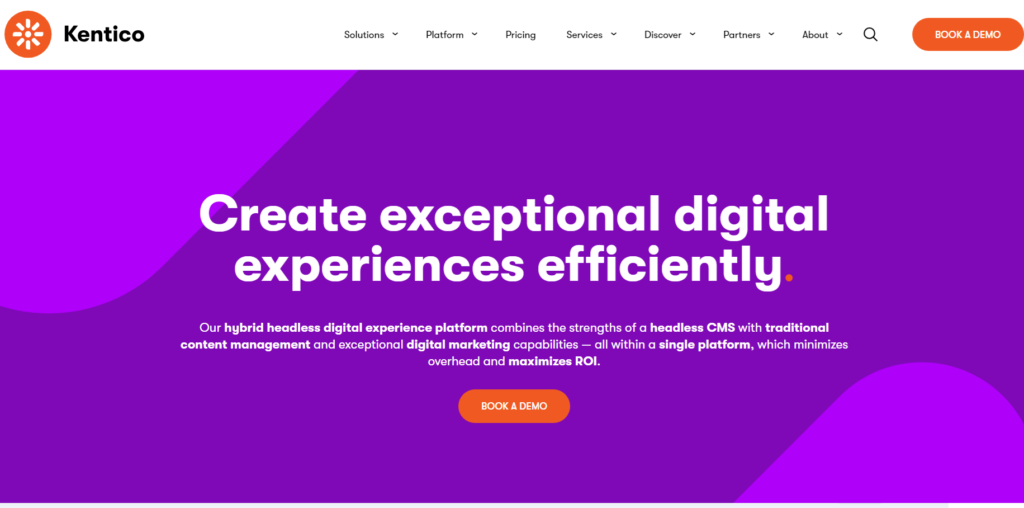
Kentico is an integrated content, commerce and marketing solution for companies, which entails content management for websites, marketing automation for e-business, and e-commerce solutions for business growth.
Key Features:
- Web Integrated e-shop functionality,
- marketing automation,
- targeted functions,
- large capacity, and easy to manage graphical interface.
Pros:
- A broad range of features aimed at content management, e-sales, and promotional campaigns
- User-friendly interface that allows authors to edit content with relative ease.
- High site scalability and performance for business corporations websites
Cons:
- Relatively expensive for the small businesses or individuals to incorporate in their use for products or services.
- A steep learning curve if you want to use the advanced features
- Limited versatility when it comes to certain usage scenarios.
Pricing: Annual pricing starting at $999 per month for the basic package; any additional features necessary will incur extra cost for sites, hosting, and support.
Website: https://www.kentico.com/
9. PrestaShop
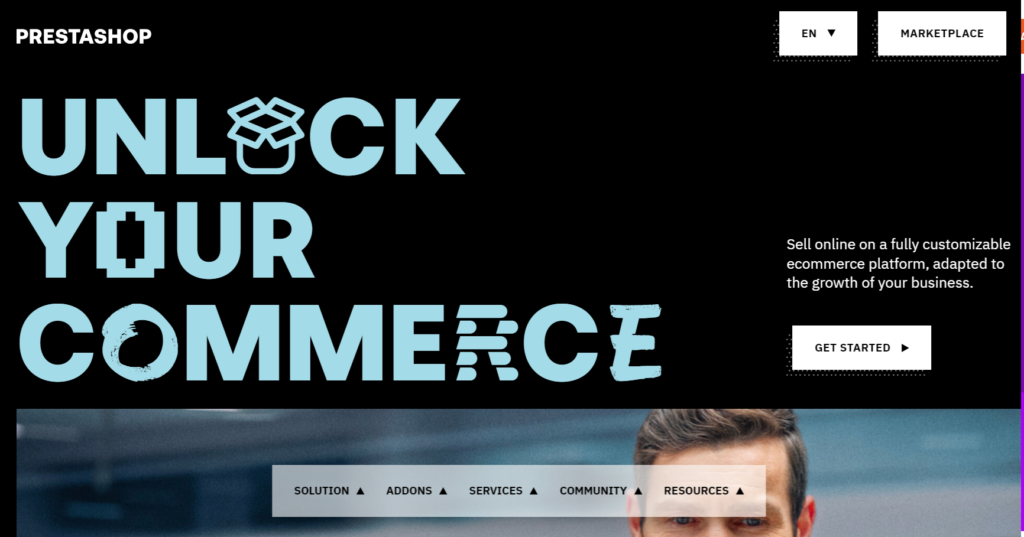
PrestaShop is an open source e-commerce solution that is preferred and used by many online merchants and retailers as it provides a multitude of features and flexibility.
Key Features:
- User-friendly interface which provides easy control over the e-stores,
- management of product categories and subcategories,
- built-in management of payment gateways, tools which are helpful in SEO practices.
Pros:
- The program is simple to use and works with computers very conveniently.
- Flexible and modular features with a broad range of available add-ons
- Strong community support and had many resources to pull from.
Cons:
- Scalability issues remain a substantial challenge
- Software is not updated from time to time.
- Very little utility for any other sort of website.
Pricing: Free of charge
Website: https://prestashop.com/
10. Sitecore
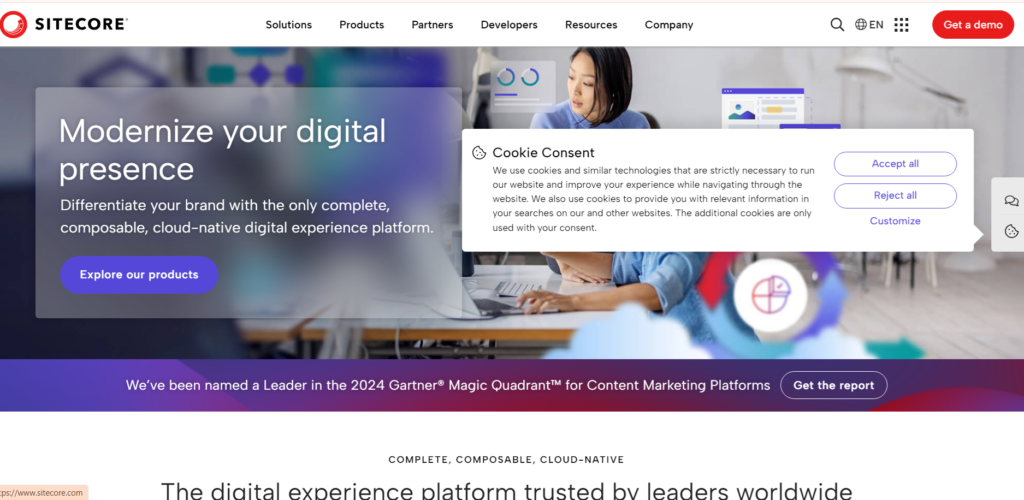
Sitecore is a robust and integrated digital experience provider that has elements of content management, e-commerce, and marketing automation systems in its architecture.
Key Features:
- Effective targeting and customization of consumers,
- use of a consecutive-channel approach, utilizing automation for marketing,
- providing detailed statistics and reports,
- the ability to expand the client base, and
- friendly and flexible program development.
Pros:
- Effective user targeting and efficient content distribution across multiple channels
- The features are extensive and can cover many aspects that are needed for content management systems, e-commerce store, and marketing.
- Highly scalable and appropriate for providing large corporate web portals.
Cons:
- Steep learning curve and or complexity concerning other elements and features.
- Relatively costly in terms of hosting and maintenance
Pricing: Offered a number of different pricing models
Website: https://www.sitecore.com/
11. Wix
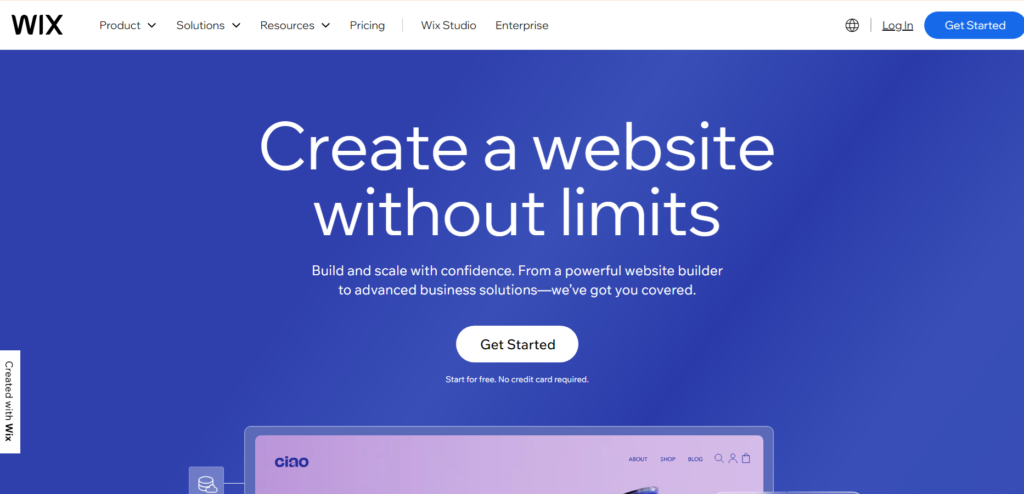
Wix is an online website development platform combined with content management services that work with templates designed by the system to create a site without coding skills.
Key Features:
- Interactive site creation tools like the drag-and-drop feature,
- responsive template designs, easy to incorporate shopping carts,
- SEO functionalities, and marketing and analytics functions.
Pros:
- Easy to use and designed for newbies
- No need of software installation on the host or hosting
- List of available templates and options for design
Cons:
- Compared to some other platforms, the degree of customization is lower.
Website: https://www.wix.com/
12. Sitefinity
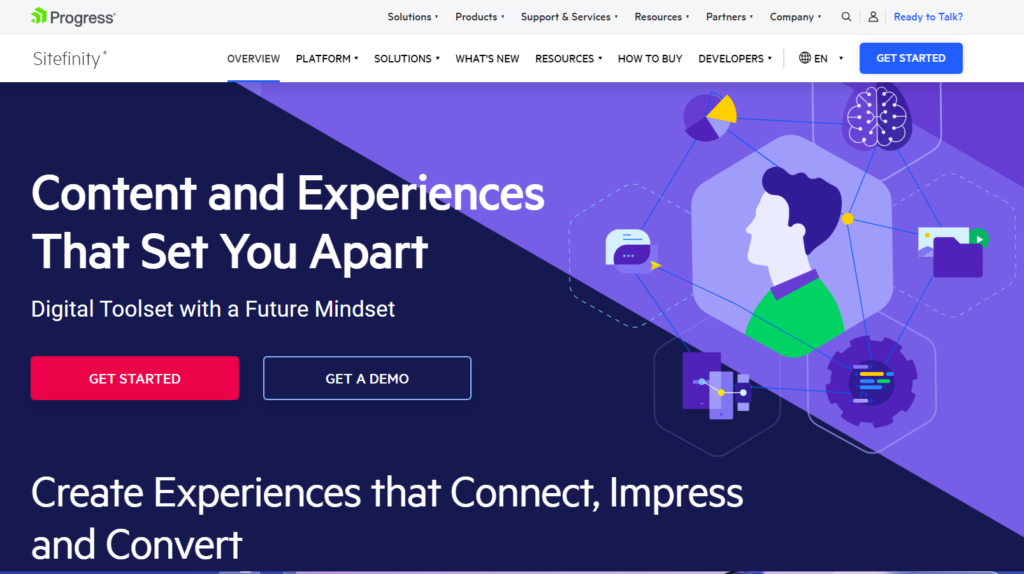
It is a multipurpose digital experience platform that features a content management system, and e-commerce and marketing automation toolset for large-scale organizations.
Key Features:
- Customization and simplicity,
- ability to add and update multiple pages, advanced targeting for e-mail and other platforms,
- automation assets, integrating for growth, and strong security.
Pros:
- Ease of use / intuitive CM Interface
- Integrated digital self-service capabilities with high personalisation
- Top scalability and performance for enterprise websites.
Cons:
- Relatively expensive for small business
- Limited flexibility for tailored implementation in special applications
Pricing: Prices Vary
Website: https://www.progress.com/sitefinity-cms
13. TYPO3
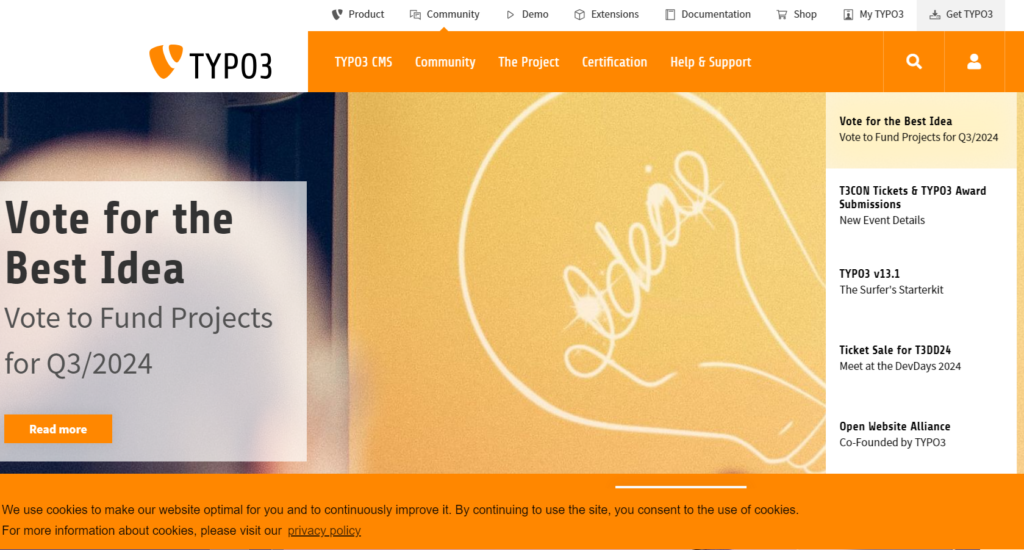
TYPO3 is another powerful open source CMS that provides flexibility and scalability and comes with a strong content management feature perfect for large websites or applications.
Key Features:
- There are several features which make it unique like – modularity, the ability to customize the software under and over depending on the needs of a particular organization,
- its support of multiple languages, and the active developers’ community.
Pros:
- Very effectively extensible and designed for large and sophisticated web applications.
- Sufficient measures for security and timely modification.
- Flexibility and customizable solutions
- High commitment to accessibility and multi-lingual essentials
Cons:
- Steep learning curve for non technical users
- Compared to other platforms like Joomla, it has a relatively less number of out of the box features.
- It has a complicated installation and configuration.
Pricing: Free for the user and available for installation on the Internet.
Website: https://typo3.org/
14. Concrete
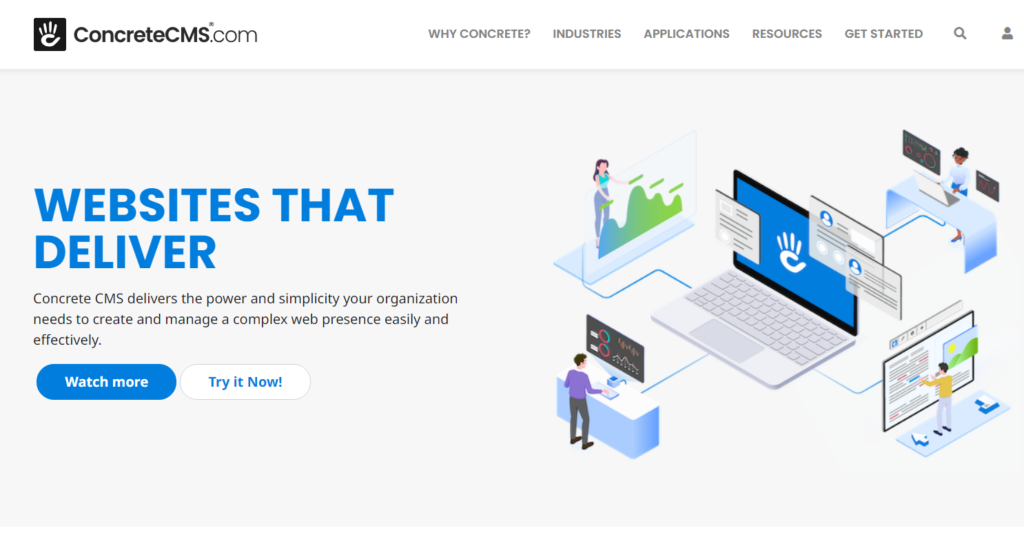
It is an open source yet the simplest content management system to use and its features and ease of use makes it ideal to be used by different websites.
Key Features:
- Some of the advantages of using the Freemium content editor software include; Convincing editing interface, Search Engine Optimization feature, and easy to use by non-professionals.
Pros:
- Does not require the professional level of navigation.
- Program friendly design, various options for mobile optimization
- High levels of optimization; the use of the right keywords; website ranking and traffic numbers.
- Perfect for a wide range of website topics, including portfolio, blog, online store, repairing services, etc.
Cons:
- High degree of complexity not really suitable for large websites
- Relatively smaller community when compared with some other CMS systems.
Pricing: Free of charge, with some features that may be accessed for a fee and products with a cost affordable to any individual may be sold through customizable templates and domains.
Website: https://www.concretecms.org/
15. Magnolia

Magnolia is an ideal option for businesses that need strong content management and that are at an enterprise level or handling digital experiences.
Key Features:
- A number of advantages can be listed: headless content delivery, the ability to personalize and target content, the possibility to publish the content across multiple channels,
- Proven ability for scalable systems, and highly suitable architecture for developers.
Pros:
- Best suited for large and complex websites
- Highly customizable and four-way mirco-targeted communication solutions
- There is a nice set of security options and rather frequent update releases.
Cons:
- Steep learning curve for the ones who are not very technically inclined.
- Relatively high, especially in cases for businesses or individuals.
Pricing: Free Open Source CMS
Website: https://www.magnolia-cms.com/
Conclusion
The different commercial content management systems provide numerous options and functionalities for various requirements of businesses and websites. Therefore, while selecting one of the best CMS platforms, it is essential to consider your own requirements, your budget, and the level of IT proficiency to ensure that all the factors are on the right side before making a final decision that will bring success to you in the long run.
FAQs
WordPress is currently the leading CMS platform for millions of websites around the World as it supports more than 40% of global traffic.
Among the widely used general CMS platforms to create and manage e-commerce websites, the following platforms are notable — Magento, Shopify, and PrestaShop.
It is a CMS that separates the content storage from the delivery methods so the same content can be delivered across the web, mobile, and other platforms.
Content Management Systems such as Sitecore, Kentico, Sitefinity, and Magnolia are at the top of their respective classes as they provide scalability, a variety of unique and useful features and they are highly secure.
